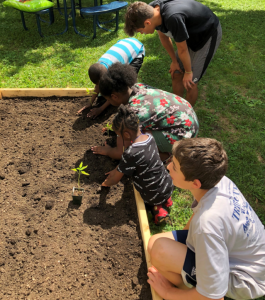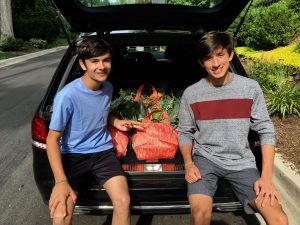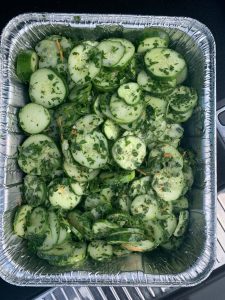Off the BEETen Path
By: Eve London
One day during his sophomore year, Bethesda-Chevy Chase (B-CC) senior Chander Payne forgot his lunch so he went to the school cafeteria. Payne was taken aback when he saw that the “fresh vegetable of the day” was French fries. “There was a food desert,” and Payne knew he had to address the issue.
That summer Payne volunteered with local for-profit organizations Up Top Acres and Love and Carrots. His experience helped him conceptualize and develop his plan to create Urban Beet.
Payne describes Urban Beet as an organization that “creates urban farms to provide fresh vegetables and community workdays to underserved youth in the DMV.” Payne launched Urban Beet in B-CC’s courtyard, exterior garden space, and greenhouse. Payne originally started working with a B-CC club, Pantry Partners, which provides food, toiletries, and clothing for needy B-CC students. Urban Beet started donating fresh vegetables to the pantry. For the last two years, Payne has been fortunate to have a passionate team helping him maintain and expand Urban Beet.
B-CC senior Kesh Khanna, the Director of Operations for Urban Beet, has been friends with Payne since they were four years old. “They have always bounced ideas off of each other,” Khanna notes. Payne “had this interest in gardening, and I had this budding social entrepreneur interest so he asked me about ideas on how to improve Urban Beet and eventually he asked me to come on board.” Payne asked B-CC senior Fin Zakas, who helped Payne start gardening at B-CC to join the team as Farm Director of Urban Beet.
 Payne and his growing team have taken full advantage of B-CC’s available space.
Payne and his growing team have taken full advantage of B-CC’s available space.
After they began harvesting, they gave produce to teachers and to front office administrators. “They really took a liking to us,” says Khanna. The “guidance counselors would come [visit the gardens] during the summer and check in and see how we were doing. They saw the value of the work that we were doing.” Inspired by The Yellow Tulip Project, Urban Beet also planted yellow tulips in the B-CC gardens to represent an end to mental health stigma.
Payne and Toby Wells-Zimmerman, who is particularly interested in social justice envisioned community workdays. Payne “reached out to about 20 homeless shelters” and got a response back from The Homeless Children’s Playtime Project (HCPP). Over the course of the summer Tora Burns, HCPP’s head, brought a group of 8-12-year-olds to work with Urban Beet at B-CC.
Khanna explains that the kids got to choose all the vegetables and plants they wanted to grow. Beets, kale, cantaloupe, lettuce, blueberries, celery, tomato, and corn were popular. The kids’ dedication “inspires” Khanna. He is amazed by how passionate the kids are about the field of environmental justice and “finding a release through gardening.” Zakas remarks that “seeing the kids’ eyes light up when they are planting and seeing the impact that Urban Beet is making in the community is really a great feeling and keeps me going.” Payne adds that “the community workday programs is a beautiful idea…regenerating the soil and being close with our earth and…inspiring kids.”
 Besides community gardens, Urban Beet has also partnered with businesses like True Food. Urban Beet provides produce and distributes chef-made meals for homeless shelters, a truly fulfilling experience, Khanna remarks.
Besides community gardens, Urban Beet has also partnered with businesses like True Food. Urban Beet provides produce and distributes chef-made meals for homeless shelters, a truly fulfilling experience, Khanna remarks.
Right now Urban Beet is assembling the team for next year. Khanna’s younger sister and siblings of other graduating members of Urban Beet will be assuming their roles. Payne and team are especially reaching out to underclassmen to gauge interest and build awareness. The Urban Beet team hopes that “if someone walks by the farm they know how they can get involved and with whom to speak if they are interested.” Continuing Urban Beet’s work is crucial to Payne and the other senior team members of the organization.
Colleges are fascinated by Zakas’ work with Urban Beet, some even suggesting that he might be able to create a chapter at their school. Khanna believes that “it would be such a cool opportunity” to take all of the experiences and skills Urban Beet has given him to college. Payne is even taking a gap year to expand Urban Beet. Payne is going to be spending a month in Memphis “because [he] feels that it faces some of the same issues as DC.” Payne also plans to make a chapter in Delaware, Virgina, and other parts of Maryland. Payne absolutely plans to bring a chapter to college wherever he goes.
If you would like to learn more about Urban Beet’s inspiring mission, team members, and partners check out their website.
 References for this blogpost include: Urban Beet’s interview with Bethesda Green Environmental Leader Eve London and http://www.urbanbeet.org/
References for this blogpost include: Urban Beet’s interview with Bethesda Green Environmental Leader Eve London and http://www.urbanbeet.org/





